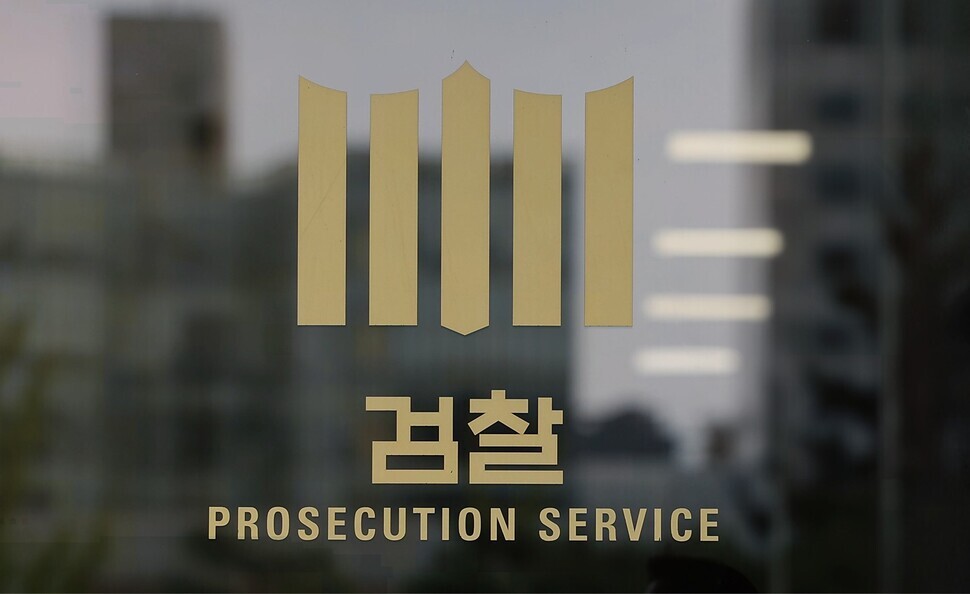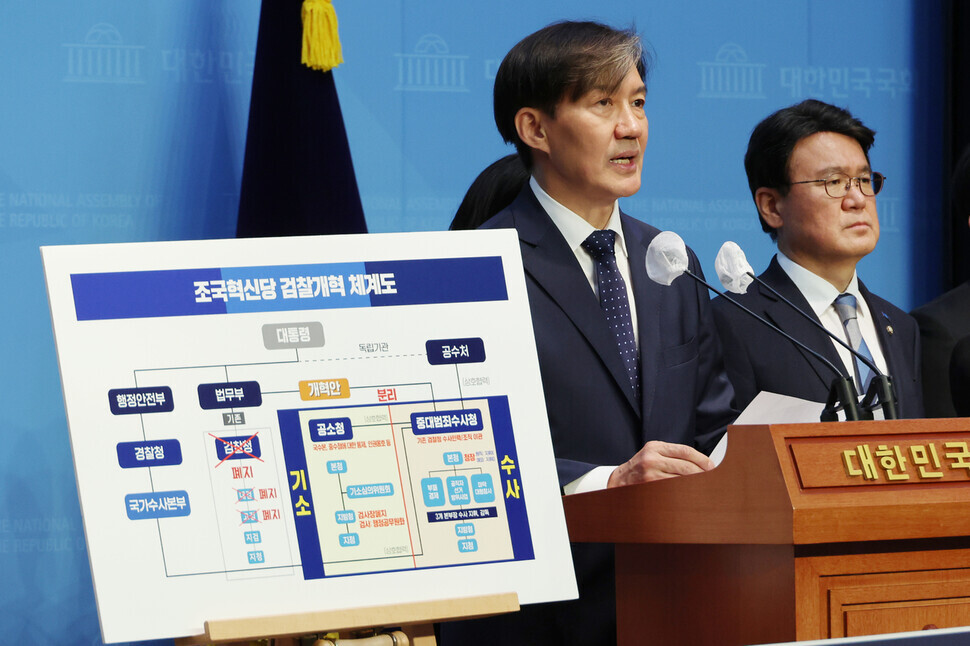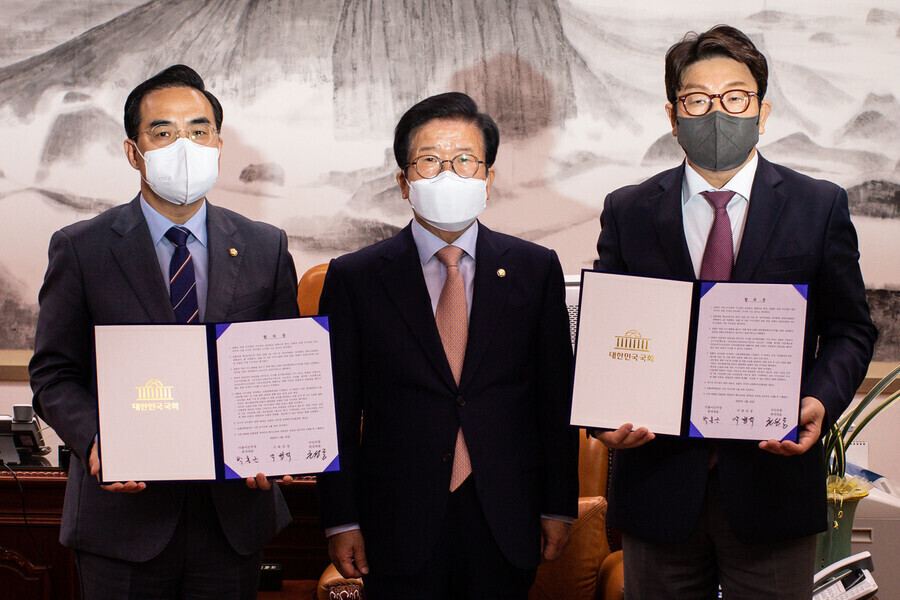hankyoreh
Links to other country sites 다른 나라 사이트 링크
Yoon’s prosecutors are throwing everything at the president’s opponents to see what’ll stick

Lee Jae-myung was indicted yet again on June 12 on charges of third-party bribery as well as violations of the Foreign Exchange Transaction Act and the Inter-Korean Exchange and Cooperation Act. The (now former) Democratic Party leader is about to find himself battling four court cases simultaneously.
The first case is concerned with alleged violations of the Public Official Election Act. Lee is charged with claiming that he was not familiar with Kim Moon-ki, who had been the Seongnam Development Corporation’s deputy director of development, and falsely claiming that the Ministry of Land, Infrastructure, and Transport had pressured him to change the zoning of the Baekhyeon neighborhood to allow for development, all in the lead-up to the 2022 presidential election.
The second court case concerns the development projects in the Daejang and Baekhyeon neighborhoods and Wirye New City, and the Seongnam FC scandal. The trial is a result of the court merging the prosecution’s two separate indictments and will be time-consuming seeing how it is an amalgam of four separate cases.
The third case concerns alleged subornation of perjury. Lee was accused of coaching a witness to make a false statement during a court trial in 2018, where he was indicted on charges of violating election law for impersonating a prosecutor.
The fourth is concerned with Lee’s alleged involvement in the SBW Group’s remittance of money to North Korea. The prosecution service requested arrest warrants for the three cases mentioned above, only to be dismissed by the courts. Prosecutors then indicted Lee for bribery in the Baekhyeon neighborhood case and the subornation of perjury case respectively. The fund transfer case was put on hold for continued investigation, but Lee was later indicted after a sentence was handed to the former vice governor of Gyeonggi Province, Lee Hwa-young, in the first trial on the case.
Lee’s indictment in the North Korea cash transfer case shifted the mood in the media and political worlds overnight. On June 21, Lee Gi-hong, an editor-at-large at the DongA Ilbo, wrote an opinion piece titled, “How Lee Jae-myung-style success will impact youth education and community values.”
“The ‘Lee Jae-myung problem’ has now reached a point where it cannot be solved by merely calling for a moral awakening. The only resolution will be achieved when the justice system fulfills its responsibilities,” the longtime journalist wrote.
On June 19, Yoo Sang-bum, Joo Jin-woo, Choi Bo-yun, and other members of the People Power Party’s special committee to “stop Lee Jae-myung’s sullying of the judicial system” visited the Supreme Court to call for a swift verdict against Lee. Their arguments and actions demonstrate their strong conviction that these court cases should end Lee’s political career once and for all.
While Kim Keon-hee and Han Dong-hoon escape prosecutorial investigations…
But no matter how much I think about this issue, something seems off. Is Lee the biggest fraud in history? Are his “crimes” so heinous that he deserves to be facing four trials at once?
Most of the charges levied against him are related to elections or his work as mayor of Seongnam and later governor of Gyeonggi Province. He did not accept any huge bribes, nor did his crimes seem so grievous that he should be held morally reprehensible.
So what happened? Why is Lee being put on not one, but four trials all at once?
Lee lost to Yoon Suk-yeol by 0.73 points in the March 2022 presidential election. Prosecutors’ indictments of Lee all took place after the presidential election. If Lee had won the election, would the prosecution have been able to touch him?
Presidential privilege grants those in office immunity from indictment, but they can be indicted before being officially inaugurated. Would prosecutors have indicted Lee if he had been the president-elect? I have my doubts. In fact, forget an indictment, I find it hard to believe they would have marshaled much of their resources into a proper investigation at all.
We have to conclude that the prosecution service’s no-holds-barred investigation and indictments of Lee are political retaliation aimed at grinding down the president’s opponents.
Whether or not Lee Jae-myung is guilty is ultimately a matter to be decided in court. There is also the possibility of even more indictments.
It does not appear likely that Lee will receive acquittals on all charges in all his trials. Even if the crimes in question are not grievous enough to warrant severe moral censure, judges may still find him guilty of one or more. This may seem unfair from Lee’s perspective, but it is the reality.
This sort of irrational situation happens because the prosecutors have a monopoly on investigation and indictment powers. It happens because the president is himself a former prosecutor general. It happens because of the so-called “Yoon Suk-yeol division” within the prosecution service.
A while back, one politician and former prosecutor told me, “Even among the prosecutors, the Yoon Suk-yeol division has been criticized for their excessively harsh investigation tactics.”
“By their nature, the prosecutors’ investigations are targeted investigations,” they continued. “You can poke around and find any number of charges, but you tend to ignore the minor ones in exchange for admissions on the major charges. It’s essentially plea bargaining. This is also a way to avoid having the suspects resent prosecutors.”
“But the Yoon Suk-yeol division poked around and pursued indictments on every single accusation that came up. They didn’t mind if the court acquitted them later,” they said. “If you throw a few dozen stones at someone, at least a few will smack them in the head. Those are their tactics.”

A prime example of someone targeted by the Yoon division for a kitchen sink investigation is former Minister of Justice Cho Kuk.
In 2019, President Moon Jae-in named Cho — the Blue House senior presidential secretary for civil affairs at the time — as his candidate for justice minister. While his confirmation hearing was underway in the National Assembly, then-Prosecutor General Yoon Suk-yeol successfully requested a search and seizure warrant and launched a forcible investigation.
It was an unheard-of example of the prosecutors interfering with the president’s exercise of appointment powers. The Korean public knows what happened next: the Yoon division ended up indicting Cho, as well as his wife Chung Kyung-sim and his daughter Cho Min. As Daegu Mayor Hong Joon-pyo put it, the whole family was “slaughtered.”
To be fair, all three of them may have done things worthy of punishment. But anyone can see that the Yoon division’s onslaught against Cho and his family was excessive. Indeed, the strong response to Cho’s Rebuilding Korea Party — which secured 12 seats in April's general election — suggests that many Korean voters viewed the situation more or less the same way as I did.
The “fairness” debate might not have happened had the Yoon division investigated other suspects with the same thoroughness they applied to Lee Jae-myung and Cho Kuk.
But when it has come to their own — Yoon Suk-yeol himself, first lady Kim Keon-hee, or former Minister of Justice Han Dong-hoon, for example — the Yoon division has not pursued investigations at all. Their justice has been a false justice: harsh to others and magnanimous to their own ilk.
Prosecution reform plan approved even by PPP lawmakers
So what needs to be done? The answer is to reform the prosecution service. The investigation and indictment powers that prosecutors currently monopolize need to be separated, and prosecutors’ direct investigation powers need to be abolished.
Opinion poll findings shared on May 14 by Mediatomato showed 53.1% of respondents agreeing that prosecutors’ investigation and indictment powers should be separated, with 29.6% voicing opposition and 17.3% saying they were unsure. It appears that even the broader Korean public has come to the conclusion that it’s time to divvy up the powers of prosecutors. (See the homepage of the National Election Survey Deliberation Commission for more details about the survey.)
In the political world, the Rebuilding Korea Party has been at the vanguard of the push for prosecutorial reform. On Wednesday, the party announced plans for four pieces of legislation aimed at reforming Korea’s public prosecutors: one for a newly created “indictment agency,” one for an “agency for the investigation of serious crimes,” one for an investigation procedure act, and an amendment to the Criminal Procedure Act.
Central to this legislation is the approach of transferring prosecutors’ investigation powers to a newly created agency for the investigation of felonies, while turning the prosecutors themselves into an “indictment agency” focusing exclusively on indictments and sustainment of prosecution.
The Democratic Party also has a prosecutorial reform task force working on plans under the leadership of Kim Yong-min. Among the approaches under examination are one in which the Supreme Prosecutors’ Office is abolished and a new indictment agency created in its place, and another in which the office is retained but assigned only indictment powers, with investigation powers transferred to the National Office of Investigation or an agency for the investigation of serious crimes.
Once submitted to the National Assembly, the Rebuilding Korea Party and Democratic Party’s prosecutorial reform legislation will undergo a review by the Legislation and Judiciary Committee before being put before the assembly’s regular session. This suggests that plans for reforming the prosecution service may emerge as one of the biggest hot-button political issues of the summer.

Are all lawmakers with the ruling People Power Party united in opposition to prosecutorial reforms? Not at all. After the presidential election on March 9, 2022, a surprise bipartisan agreement on prosecutorial reforms was reached on April 22, less than a month before Yoon officially took office.
“The direction would be the separation of prosecutors’ direct investigation and indictment powers. The prosecutors’ direct investigation powers would be time-limited in nature, and investigation and indictment reviews would be kept separate even in cases of direct investigation,” the agreement between ruling and opposition parties read.
“The prosecutors’ direct investigation powers would be abolished once other investigation institutions besides the prosecutors reach a certain level of crime response capabilities,” it went on.
“A special committee for judicial reform is to be formed with the authority to review legislation. This special committee is to hold in-depth discussions on all aspects of the judicial system, including what is provisionally being called an ‘agency for the investigation of serious crimes’ (‘Korean FBI’). Legislative measures for this agency are to be completed within six months of the special committee’s formation, and the agency is to be launched within one year of the legislative measures. Once the agency for the investigation of serious crimes is launched, the prosecutors’ direct investigation powers are to be abolished,” it continued.
Preventing political interference by prosecutors
Does this come as a surprise? The arbitration plan in question was developed by National Assembly Speaker Park Byeong-seug. It was announced by Democratic Party floor leader Park Hong-keun and his PPP counterpart Kweon Seong-dong following ratification by general meetings of their respective lawmakers.
But all of it ended up falling by the wayside when vested legal world interests and conservative newspapers came out strongly opposed, while then-president-elect Yoon quietly pivoted to an opposing position.
So it seems quite likely that Yoon will exercise his de facto veto on any prosecutorial reform legislation that is passed. The question is what happens next.
The lawmakers who sided with the prosecutorial reform plan in April 2022 are still part of the PPP. They likely see an issue with prosecutors continuing to hold the sort of absolute power they currently have.
Ballots for a renewed vote in the National Assembly’s regular session are cast anonymously. Could the PPP end up voting the legislation down?
Let me wrap things up by stressing that reforming the prosecution service is a paramount task for our times. If prosecutors are left to carry on as a group with untrammeled power, they will continue working to control politics in the Republic of Korea. Any politician who opposes them could end up as the next Lee Jae-myung or Cho Kuk.
The prosecutorial fiefdom has to be stopped, and that will require taking their sword away from them. This is the only way that the Korean public can exercise its sovereignty and democracy can be upheld.
What do you think?
By Seong Han-young, senior staff writer
Please direct questions or comments to [english@hani.co.kr]

Editorial・opinion
![[Column] How tragedy pervades weak links in Korean labor [Column] How tragedy pervades weak links in Korean labor](https://flexible.img.hani.co.kr/flexible/normal/500/300/imgdb/original/2024/0703/8717199957128458.jpg) [Column] How tragedy pervades weak links in Korean labor
[Column] How tragedy pervades weak links in Korean labor![[Column] How opposing war became a far-right policy [Column] How opposing war became a far-right policy](https://flexible.img.hani.co.kr/flexible/normal/500/300/imgdb/original/2024/0702/5017199091002075.jpg) [Column] How opposing war became a far-right policy
[Column] How opposing war became a far-right policy- [Editorial] Korea needs to adjust diplomatic course in preparation for a Trump comeback
- [Editorial] Silence won’t save Yoon
- [Column] The miscalculations that started the Korean War mustn’t be repeated
- [Correspondent’s column] China-Europe relations tested once more by EV war
- [Correspondent’s column] Who really created the new ‘axis of evil’?
- [Editorial] Exploiting foreign domestic workers won’t solve Korea’s birth rate problem
- [Column] Kim and Putin’s new world order
- [Editorial] Workplace hazards can be prevented — why weren’t they this time?
Most viewed articles
- 110 days of torture: Korean mental patient’s restraints only removed after death
- 2[Editorial] Korea needs to adjust diplomatic course in preparation for a Trump comeback
- 3[Column] How opposing war became a far-right policy
- 4Nine dead in Seoul after car plows into pedestrians
- 5Korea to create dedicated population strategy ministry to combat low birth rate, aging society
- 6Samsung Electronics workers to go on first strike in company’s 55-year history
- 7[Editorial] Silence won’t save Yoon
- 8Son Heung-min’s father, brother accused of child abuse at football academy
- 9Japan is building a military meant for more than self-defense — and has the US to thank for it
- 10Dispatched into unknown danger, foreign day laborers were defenseless against blaze